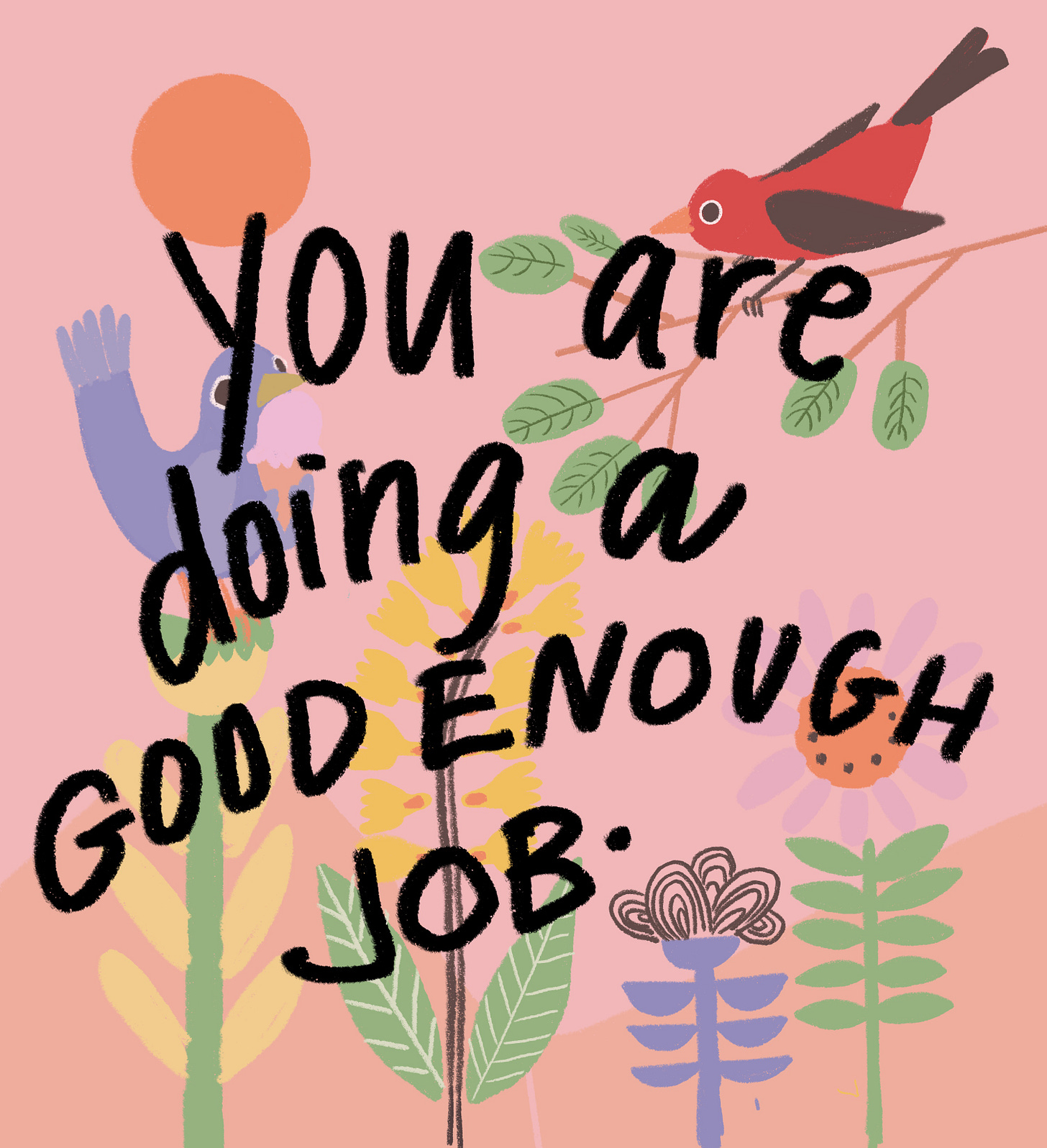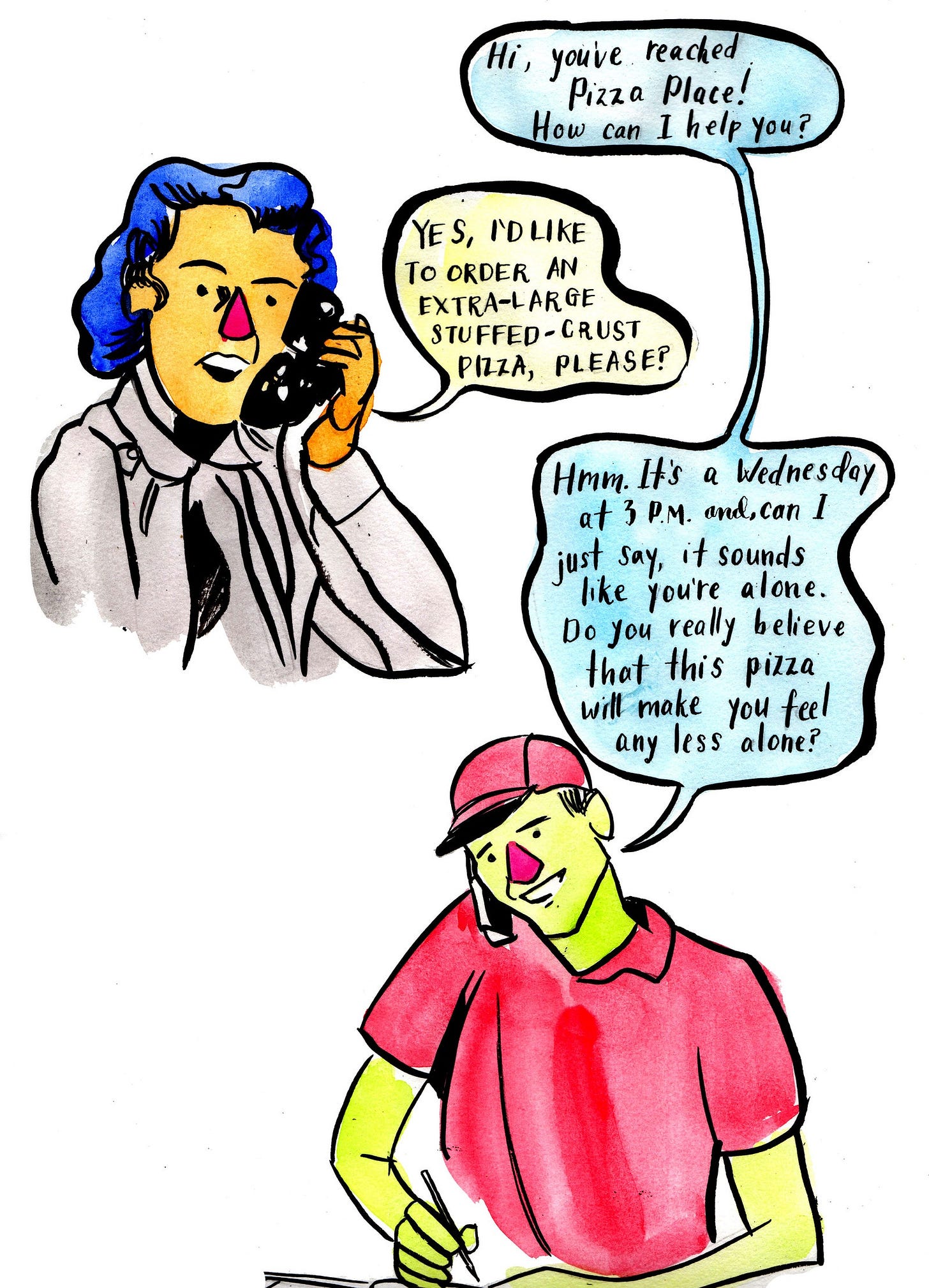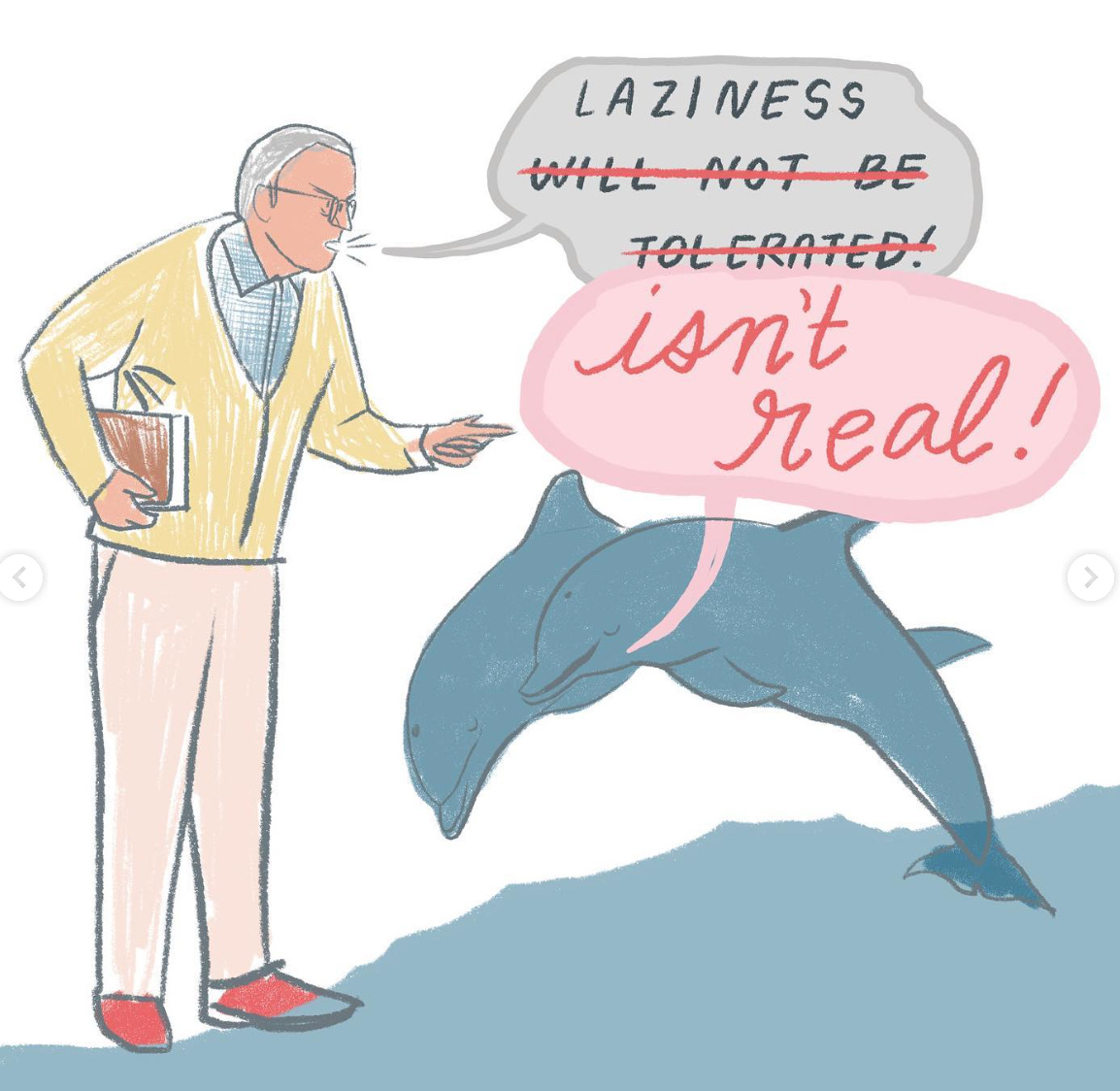A Note for You, If You’re Having A Bad Day
Dear Friend,
Last week I wrote about the fear of getting in trouble — and plenty of you wrote back and told me that yes, you felt it too. (Thank you. I feel so much less alone! And I hope you do too.)
But I only got through the part where the fear is there without cause; the unsubstantiated idea that if you order a pizza, someone will say, “YOU WILL BE PUNISHED FOR YOUR LOVE OF GLUTEN,” and then the punishment will ensue. There’s a whole other layer, which is that sometimes you’re afraid you’re going to get in trouble because you’ve done something that toes an ethical line — an actual faux pas (or worse) for which you might get caught.
If you are a person who truly never lies, or fudges, or skims, or cheats — then this email is not really for you. You, Person, are appreciated and loved. But, frankly, hard to relate to. Go get yourself a nice cookie and check back in next week.
I think people lie more often than they tell the truth about (there’s a sentence for you). Every semester, for example, I fall head over heels for all of my students — and every semester, I’m more than a little heartsick when the first batch of papers rolls in and I have to confront the sheer volume of the ones that are super obviously written using AI. Not just a little AI here and there; pure, unedited, unmistakable AI papers. This has only been going on for the past three years, since the public release of Chat GPT. It started slowly, but has snowballed. A lot.
In the beginning, I felt like I knew exactly how I would handle papers written by Chat GPT: I would just grade them as though they were papers written by humans and move on with my life. My reasoning: the only people who really suffered because they were using AI would be my students, who would be denying themselves the full worth of their (expensive) education by refusing helpful feedback from a person who knows what they’re doing.
But then the papers started actually coming. Papers written by AI are so empty and so much less interesting than even the worst human-written paper. There are altogether too many adverbs, and the platitudes are so broad. Have you ever eaten a packing peanut made out of potato starch, just because such a thing is possible? Reading a paper written by AI feels a lot like that.
So these days I confront the students. There are many reactions to this kind of confrontation (which I try to keep lighthearted but stern). Sometimes the students try to insist that they haven’t used AI. Sometimes they say nothing and turn in a revision a few weeks later. (The “pretend this didn’t happen, even though it so obviously did” approach.) Sometimes they apologize so much I feel bad for them. Someone recently responded by saying, “I have been stretched so thin lately, and so I made a dire mistake and accidentally used AI to write the paper.” I know that feeling. The feeling of, “I wouldn’t have done this if I had thought I’d get caught.”
But this first detail, about being spread too thin. That’s often what’s at the heart of a decision to break a rule. Almost always, the rules we break have to do with our own limits, which have often already been exceeded. It is difficult for me to blame a student who I know is taking my Liberal Arts class because she is required to, and not because she wants to. She is slammed in all her other classes, and she also has a job, and a family, and a boyfriend. It’s not that she is refusing to learn from me; it’s that there are only so many hours in a day, and she’s weighing her options, and the least bad one feels like it would be to lightly cheat on an assignment that she, frankly, doesn’t care about.
There’s a nagging belief that we have more capacity than we have. If we were more strategic, we could make better work, faster, and in greater quantities. We could do more. We could do everything! And so part of what happens when you get caught, when you get in trouble, is that you experience shame. A better person would have been able to do this. I could have done a better job. But I didn’t.
Then there’s lying, which I’ve also witnessed frequently, and about such innocuous-seeming things, since I started teaching. Once a week, a student tells me that they worked on a project for fifteen hours straight. And maybe they did — but also, maybe they worked on a project for many hours, and it felt like fifteen, and the number fifteen, while not technically accurate, is the number they have chosen to say out loud. (It is a number that would mean that you started working at 8 a.m., and didn’t stop working until 11 p.m. A thing that, I’m so sorry, I have never known a college student to literally do.)
Memorably, I had a student who lied that his mom was in the hospital with cancer. She called to ask about one of his assignments, and boy was I embarrassed when I asked whether she was home yet. And while that was among the only times I really caught a student lying, I think it happens a lot. I lied about this kind of thing in high school. You do it when you think your emotional truth doesn’t match the actual truth, and you’re afraid you won’t be seen or heard. Sometimes, we desperately want to be cut some slack; to be let off certain hooks, and to be held the way kind adults hold very young children. There’s a Whitmer Thomas lyric I think about all the time that goes, “I want to have a secret / that when everyone hears it / it makes them all forgive me / for being so annoying.” That.
On TV, the lie is always the worst thing. “It’s not that you did it; it’s that you lied about it.” But that very conceit is itself a lie. People don’t generally lie if they think the truth will garner the response they want. We want people to love us; to admire and think highly of us. We don’t want people feeling disappointed, or having to forgive us out of the kindness of their hearts. Lying happens, often, in moments of paltry resources; in times when we are more limited than we wish we were.
And, crucially, people mostly don’t get caught lying. If you’ve ever thought to yourself, “I’m a good liar,” it’s because you’re a normal human being who doesn’t live life on a sitcom where you can’t lie without expecting the truth to emerge within a tight 30 minutes (22 if you don’t count commercials). And so we all go around thinking people’s lives are harder and easier than ours; believing that everyone else is more capable, stronger, grittier, and better than we could ever be. That means most people feel sometimes fraudulent and shitty about themselves, and they keep lying so that they can hold on to the life they’ve lied their way into. This is the result of a culture that normalizes lying.
In All About Love, bell hooks writes, “To be loving we willingly hear each other’s truth and, most important, we affirm the value of truth-telling. Lies may make people feel better, but they do not help them to know love.” Of course, of course, of course there are reasons to lie — especially in a police state where vulnerable populations are made infinitely more vulnerable with every true detail that surfaces about them. I’m only trying to tell you that you deserve love now. Whatever your truth is. Whatever your truth is.
It’s easier for me to believe that I am an inherently bad person than to wrestle with my ordinary, human fallibility. “You were born bad, and you are bad through and through” is easier to stomach than, “You made a choice. You did it because you wanted to make your own life easier. And you got caught.”
The United States was built on this Calvinist idea that hard workers were born good and they went to heaven; lazy people were born bad and they went to hell. You don’t get to choose if you’re good or bad, so people historically labored demonstrably in order to prove their goodness. There’s a kind of cultural capital on productivity that runs deep. Maybe that’s it.
But laziness isn’t actually real. What’s real is that we all make choices in order to get as many of our needs met as possible; sometimes the choices are rule-breaking, sometimes they’re cruel to others, sometimes they’re enmeshed with lies. You’re not a bad person because you made a choice that, upon reflection, isn’t one you’d make again. Bad people aren’t actually real, either.
And if they are, I hope they’ll forgive you soon. Anger is such a heavy thing to carry! It takes up so, so much space. Look: everyone does the bad thing sometimes; that’s what it means to be alive. (Except for the people I dismissed in paragraph three; but they’re not here anyway. You’re safe among fellow secret villains here.) Wake up tomorrow, and consider the possibility that the people who are meant to love you will love your truth. But that doesn’t mean you owe it to anyone, either.
Good luck out there, bravely facing all that breaks your heart.
Love,
Sophie
Housekeeping
This week, I’m sending a list of all the bird videos to the paid subscriber tier! It’s a long time coming; hold on to your hats.
Print orders will be mailed this week, and in-the-mail subscription packs will be mailed next week!
I’m writing this from the OMC Cowrite in downtown Chicago, and you could be here! It is free! So come next month. Stay up-to-date with the
newsletter, which is called . It’s a writer’s craft newsletter, mostly. But yes, whimsy is there too.
Loose Thoughts
Struggling, still, with lunch. WHAT DO PEOPLE EAT FOR LUNCH.
So, the flowers in Chicago are saving me lately, in a big way. I didn’t know the names of many flowers when I lived in Oregon, because it was always a little green there, so the early spring flowers, while lovely, weren’t life-giving. At the end of winter (we still have at least 10 days of unacceptably cold weather here, including a hard freeze, according to my weather app), I feel near death. So I do this thing with my family called SPRINGO, which hangs on the wall when you walk into the house. My daughter, who is three, has learned scylla, daffodil, snowdrop, crocus, forsythia. SHE KNOWS THEM. You can take my SPRINGO and do your own; it’s not too late. This year I added scratch-and-sniff stickers. For whimsy.
I just recently started tucking my shirt into my pants, and I think I look incredible, like a real Adult Woman. But no one is ever like, “Wow, I love your tucked-in shirt.” Do you know what I mean?
Did you know orca whales are kind of dolphin? Someone is going to have soooo much more to say about this in the comments.
So, I did watch Severance. I know I’m a little late in talking to you about this. Should we talk about what we thought about Season Two? My students are torn, and I am too.
And I’m watching White Lotus. I am watching all the prestige television and not telling you guys about it.
My daughter is DEEP IN IT with princesses, so here’s my question. Why is every child so obsessed with Elsa, when it could be argued that Anna is the hero of the story? I am not asking this in a mean way; I also prefer Elsa, for my own adult reasons. But I’m curious why every child is all Elsa all the time. My guess is that she gets the songs with the big notes, but I’m open to theories.












The line about feeling like you should have more capacity than you do hit me HARD. It is probably my greatest struggle as a person and a writer. I have talks with myself about it every day! Just before I read this I sat down to write my to do list and had to say “there is a lot I want to do; how can I pare this down to what absolutely MUST be done today?” I still think I put too much on the list.
Re: lying, I’ll always remember one time in college when I could not find my apartment keys so I couldn’t leave because my roommates were gone and I wouldn’t have been able to get inside. I frantically emailed my professor telling him that and was like “I promise I want to go to class. I am not making this up! I just am trapped in my home!” And he said it was fine and he believed me because frankly that would be a bonkers lie.
I was just having this "I'm 53 and I can't figure out lunch" convo with my husband at dinner.
Also, a college student's mom called you about one of his assignments? Is this common?!